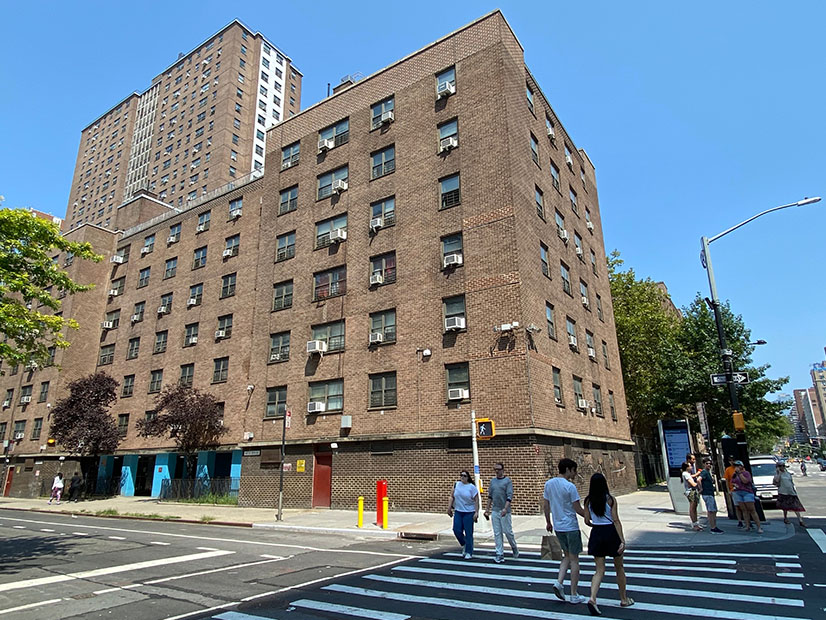
A year after New York ordered seven utilities to plan a series of thermal energy network pilot projects, none of the proposals is ready for regulatory consideration.
But progress is being made, and the Public Service Commission on Thursday issued guidance to help further develop the plans to the point at which construction can be authorized.
The Utility Thermal Energy Network initiative is a significant undertaking — one commissioner likened it to creating a new utility. A 2022 state law mandated that UTEN pilot projects be developed as a means of reducing emissions from New York buildings, which are responsible for 32% of in-state greenhouse gas production, the most of any source.
Some New Yorkers already have partly or completely electrified their homes, but many do not have this option, as they lack money or live in a multiunit dwelling. UTENs are seen as a way to reach them and contribute to the emissions reduction goals of the state’s landmark Climate Leadership and Community Protection Act.
The PSC formally set the process in motion at its September 2022 meeting, opening Case No. 22-M-0429.
The 14 proposals submitted by the utilities would cost an estimated $362 million to $435 million.
Who will pay for this and over what period is one of the big questions. There also are technical challenges, particularly in densely built urban areas; a dearth of standards and performance metrics; the sticky question of whether fossil fuels can be burned to generate the heat UTENs will share; a state law complicating efforts to drill more than 500 feet deep for ground-source heat pumps; and a shortage of workers skilled to do some of the work.
All of this points to the value of pilot projects and the need to further refine them.
In September 2022, there was some grumbling among the commissioners about the details of the state law driving the case.
On Thursday, one of the commissioners called the legislation “clunky” and said its timeframes were not workable. Projects were to be approved within six months of the legislation taking effect.
But the process drew support from commissioners, even as they asked questions about some individual details or raised yellow flags about others.
That said, the pilots clearly are not ready for prime time.
The order the PSC adopted Thursday described the utilities’ proposals as “a reasonable first step” but insufficiently detailed. It sets out a five-stage planning, review, operation and assessment process to reduce risk and increase speed while preserving the public interest.
The Department of Public Service staff or the PSC itself will review each stage of each project and must sign off before it can progress to the next stage. At any point, the PSC can terminate a project or require it to be modified.
The order presents a strong bias against any use of fossil fuel combustion in the proposed pilot systems and notes the opposition of environmental advocates in submitted comments. But it stops short of banning fossil fuels, saying the PSC might consider their use to ensure reliability and hold down costs.
Estimated costs of individual proposals range in the tens of millions of dollars.
The most expensive initially was an ambitious Con Edison plan to recycle waste heat from a data center to provide heating, cooling and domestic hot water for the New York City Housing Authority’s Fulton Homes complex in Manhattan. Renovation plans subsequently announced by NYCHA knocked the price tag down from $67.9 million to $62.4 million.
KEDNY proposed a $67.7 million project with NYCHA that would link apartment buildings, commercial buildings and a community center in Brooklyn.
Niagara Mohawk proposes to draw thermal energy from the effluent of the Syracuse metro area wastewater treatment plant to serve a new mixed-use development at a cost of up to $66.8 million.
At the other end of the scale, RG&E proposed a $13.2 million system to serve 22 buildings in a disadvantaged Rochester neighborhood.
The order directs DPS staff to convene a technical conference within 30 days and orders the utilities to submit final proposals by Dec. 15. Proposals that are judged compliant will be done with Stage 1 at that point and can progress to Stage 2 of the review.
The process is progressing slowly, and the small freshman class could get even smaller. But PSC Chair Rory Christian called the effort one of the next big steps in moving toward the state’s clean energy goals.
“We’re not just creating a new system, we’re re-imagining energy use in New York state,” he said.



